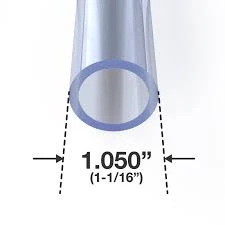វិច្ឆិកា . 07, 2024 18:40 Back to list
Exploring the Benefits and Applications of PVC Pipe in Modern Construction
The Versatility of PVC Pipes in Modern Construction
Polyvinyl Chloride (PVC) pipes have become a cornerstone of modern construction and plumbing due to their outstanding properties and versatility. Originally developed in the 1920s and gaining popularity in the 1960s, PVC pipes have transformed how we approach water supply, drainage, and sewage systems. Their myriad advantages make them the material of choice for both residential and industrial applications.
One of the most significant advantages of PVC pipes is their resistance to corrosion and chemical damage. Unlike traditional metal pipes, which can rust and corrode over time, PVC pipes maintain their structural integrity even when exposed to harsh chemicals and environmental conditions. This resilience makes them ideal for various applications, including wastewater management and industrial processes where aggressive substances may be present.
.
In terms of longevity, PVC pipes offer impressive durability. They have a lifespan that often exceeds 50 years when properly installed and maintained. This longevity not only minimizes the need for frequent replacements but also contributes to lower lifecycle costs for property owners and managers. The long-lasting nature of PVC pipes becomes particularly beneficial in large-scale projects, such as municipal water systems and commercial buildings, where maintenance and replacement can be time-consuming and costly.
pvc pipe

Additionally, PVC pipes are incredibly efficient in transporting fluids. Their smooth interior surfaces inhibit the buildup of scale and sediment, enabling better flow rates compared to other piping materials. This characteristic is particularly important in systems where water pressure is critical, such as in irrigation or fire suppression systems. The ability of PVC pipes to deliver consistent performance over time enhances their attractiveness for various applications.
The environmental impact of PVC pipes is also a significant factor to consider. They are often produced with a lower carbon footprint compared to alternative materials, such as metal or concrete. Furthermore, PVC piping systems can be recycled, ensuring that they do not contribute to landfill waste at the end of their life cycle. This recyclability aligns well with the increasing emphasis on sustainability in the construction industry and promotes a more circular economy.
Moreover, PVC pipes are versatile in their application across various sectors. From residential plumbing and electrical conduits to agricultural irrigation and drainage systems, the adaptability of PVC pipes is extraordinary. They can be utilized in a multitude of construction settings, from urban environments to rural landscapes, making them a universally applicable solution.
In conclusion, the use of PVC pipes has revolutionized the fields of plumbing and construction. Their resistance to corrosion, lightweight nature, durability, efficiency, and environmental benefits render them a practical choice for a wide range of applications. As the construction industry moves towards more sustainable practices, the role of PVC pipes is likely to grow even more significant. Whether you are a homeowner, a contractor, or an engineer, understanding the benefits and applications of PVC pipes can help you make informed decisions for your projects. The future of plumbing and water management undoubtedly looks bright with PVC pipes leading the way.
-
High-Quality HDPE Sheet | Durable Plastic Panels
NewsAug.06,2025
-
High-Precision PVC Rigid Sheets for Vacuum Forming | AI-Optimized
NewsAug.05,2025
-
Durable PVC-M Water Supply Pipes | 60-Year Life
NewsAug.04,2025
-
Premium HDPE Water Supply Pipes: Durable & Leak-Proof
NewsAug.03,2025
-
Premium PVC-M Water Supply Pipe - Durable & Efficient
NewsAug.02,2025
-
HDPE Drainage & Irrigation Pipe - Durable, Efficient Solutions
NewsAug.01,2025

